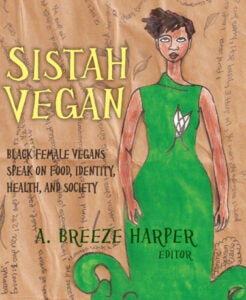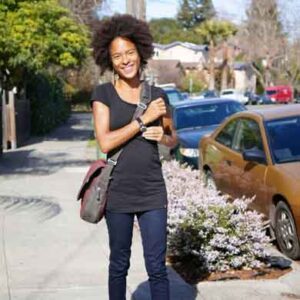UO campus Gerlinger Alumni Lounge 1468 University St.
A. , editor of the anthology Sistah Vegan: Black Female Vegans Speak On Food, Identity, Health, and Society, and the author of the social justice novel Scars: A Black Lesbian Experience in Rural White New England (2014) will talk about her writing and activism. Sistah Vegan is a groundbreaking anthology that examined how race and gender shape the vegan experience in the United States.
 Harper’s work focuses on food and social justice, veganism and vegan health activism (particularly among women of color), alternative health philosophies, feminism, post-colonialism, environmentalism, critical race theory, queerness, gender, sexuality and heterosexism, animal rights, classism and their intersectionality. She received a B.A. in geography from Dartmouth College (1998), a Master's in Educational Technologies from Harvard University (2007) and graduated summa cum-laude from the University of California-Davis with a PhD (2013 - Dissertation - Vegan Consciousness and the Commodity Chain) in critical geographies of race and food. She lives in the San Francisco Bay Area with her partner and three young children.
Harper’s work focuses on food and social justice, veganism and vegan health activism (particularly among women of color), alternative health philosophies, feminism, post-colonialism, environmentalism, critical race theory, queerness, gender, sexuality and heterosexism, animal rights, classism and their intersectionality. She received a B.A. in geography from Dartmouth College (1998), a Master's in Educational Technologies from Harvard University (2007) and graduated summa cum-laude from the University of California-Davis with a PhD (2013 - Dissertation - Vegan Consciousness and the Commodity Chain) in critical geographies of race and food. She lives in the San Francisco Bay Area with her partner and three young children.
For a full listing of panels, workshops and other events, go to: http://csws.uoregon.edu/events-2/2014-nwws/csws-northwest-women-writers-symposium-2015/
The fourth annual CSWS Northwest Women Writers Symposium “Our Daily Bread: Women’s Stories of Food and Resilience,” will be held Thursday May 7, 2015, through Saturday May 9, 2015. Diana Abu-Jaber (Crescent; The Language of Baklava; Birds of Paradise) is the keynote author and will be joined by writers Novella Carpenter (Farm City: The Education of an Urban Farmer); scholar, activist, social justice novelist, editor (Sistah Vegan; Scars); poet Donna Henderson (The Eddy Fence), and others.
This theme opens conversations about the sensuality of food; food and culture; food shortages; hunger and poverty; health and eating disorders; climate change; misuse of natural resources; environmental racism; food distribution; genetic manipulation of seeds; and preparation and growing of food. Food is our daily bread, but in the practice of writing, what else feeds us? “Our Daily Bread” is a rich theme that will open the door to fruitful discussions of craft, creativity, humanity, gender, and community.
Sponsored by the UO Center for the Study of Women in Society. Cosponsors include Eugene Public Library; Oregon Humanities Center; UO Division of Equity and Inclusion; the UO Departments of Women’s and Gender Studies, English, and Ethnic Studies; UO School of Journalism and Communication; University Health Center; UO Libraries; Wayne Morse Center for Law and Politics; and the ASUO Women’s Center.


